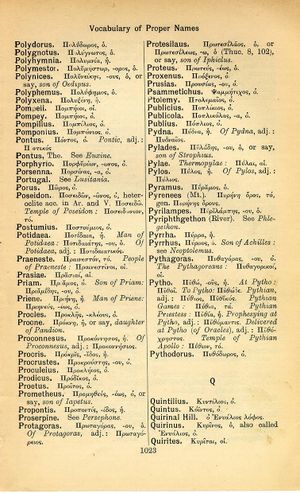Protagoras: Difference between revisions
καλῶς γέ μου τὸν υἱὸν ὦ Στιλβωνίδη εὑρὼν ἀπιόντ' ἀπὸ γυμνασίου λελουμένον οὐκ ἔκυσας, οὐ προσεῖπας, οὐ προσηγάγου, οὐκ ὠρχιπέδισας, ὢν ἐμοὶ πατρικὸς φίλος → Ah! Is this well done, Stilbonides? You met my son coming from the bath after the gymnasium and you neither spoke to him, nor kissed him, nor took him with you, nor ever once felt his balls. Would anyone call you an old friend of mine?
(6_13) |
(D_7) |
||
| Line 6: | Line 6: | ||
{{Lewis | {{Lewis | ||
|lshtext=<b>Prōtăgŏras</b>: ae, m., = Πρωταγόρας,<br /><b>I</b> a [[celebrated]] [[sophist]] of [[Abdera]], a [[disciple]] of [[Democritus]], and an [[older]] [[contemporary]] of [[Socrates]]; he [[was]] [[banished]] from [[Athens]] on a [[suspicion]] of atheism, Cic. N. D. 1, 1, 2; 1, 23, 63; id. Ac. 2, 46, 142; id. Brut. 8, 30; 12, 46; Gell. 5, 3, 1 sqq.—Hence, Prōtăgŏrīon, ĭi, n., = Πρωταγόρειον, a [[dictum]] or [[maxim]] of [[Protagoras]], Gell. 5, 11, 1. | |lshtext=<b>Prōtăgŏras</b>: ae, m., = Πρωταγόρας,<br /><b>I</b> a [[celebrated]] [[sophist]] of [[Abdera]], a [[disciple]] of [[Democritus]], and an [[older]] [[contemporary]] of [[Socrates]]; he [[was]] [[banished]] from [[Athens]] on a [[suspicion]] of atheism, Cic. N. D. 1, 1, 2; 1, 23, 63; id. Ac. 2, 46, 142; id. Brut. 8, 30; 12, 46; Gell. 5, 3, 1 sqq.—Hence, Prōtăgŏrīon, ĭi, n., = Πρωταγόρειον, a [[dictum]] or [[maxim]] of [[Protagoras]], Gell. 5, 11, 1. | ||
}} | |||
{{Gaffiot | |||
|gf=<b>Prōtăgŏrās</b>,¹⁵ æ, m. (Πρωταγόρας), sophiste d’Abdère, chassé par les Athéniens pour son impiété : Cic. Nat. 1, 2 ; Br. 30 || <b>-rīŏn</b>, ĭī, n., une [[maxime]] de [[Protagoras]] : Gell. 5, 11, 1. | |||
}} | }} | ||
Revision as of 06:47, 14 August 2017
English > Greek (Woodhouse)
Πρωταγόρας, -ου, ὁ.
Of Protagoras, adj.: Πρωταγόρειος.
Latin > English (Lewis & Short)
Prōtăgŏras: ae, m., = Πρωταγόρας,
I a celebrated sophist of Abdera, a disciple of Democritus, and an older contemporary of Socrates; he was banished from Athens on a suspicion of atheism, Cic. N. D. 1, 1, 2; 1, 23, 63; id. Ac. 2, 46, 142; id. Brut. 8, 30; 12, 46; Gell. 5, 3, 1 sqq.—Hence, Prōtăgŏrīon, ĭi, n., = Πρωταγόρειον, a dictum or maxim of Protagoras, Gell. 5, 11, 1.
Latin > French (Gaffiot 2016)
Prōtăgŏrās,¹⁵ æ, m. (Πρωταγόρας), sophiste d’Abdère, chassé par les Athéniens pour son impiété : Cic. Nat. 1, 2 ; Br. 30

